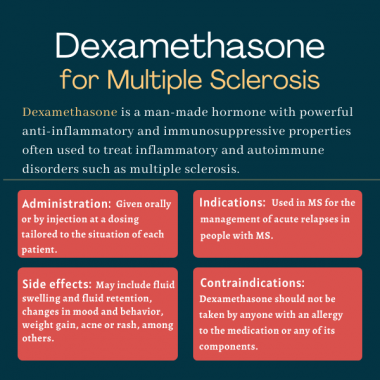FAQs about dexamethasone in MS
Dexamethasone is a corticosteroid that is used to manage acute relapses in people with multiple sclerosis (MS). By reducing inflammation in the brain and spinal cord, it can ease symptoms and help relapses resolve more quickly. Although useful for short-term symptom relief, dexamethasone does not affect the overall progression of MS.
Dexamethasone may cause harm to a developing fetus and should only be used during pregnancy if the risks are outweighed by the potential benefits of such treatment. Patients and their healthcare providers should discuss these decisions in detail based on the unique situation of the individual. [Everything remains the same, just added the link]
There is no known interaction between alcohol and dexamethasone. However, drinking alcohol while on dexamethasone may increase the chance that a person experiences certain effects from the medication. People on dexamethasone are advised to talk to their healthcare team about whether and how much alcohol is safe to drink during treatment.
In most multiple sclerosis (MS) patients, relapse symptoms ease within a few days of corticosteroid treatment. However, because dexamethasone treatment is typically tailored to a person’s needs, and every person may respond differently to a given medication, it may be hard to predict when someone will respond to this therapy.
Increased appetite and weight gain are common side effects of dexamethasone. Thinning scalp hair also is indicated on the medication’s label as a possible side effect. Patients should talk with their healthcare provider about any specific side effects they experience.
Related Articles

 Fact-checked by
Fact-checked by 






